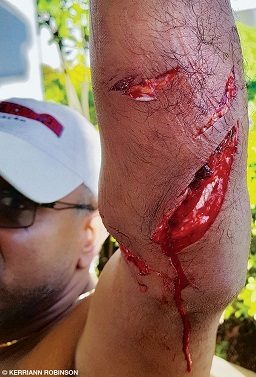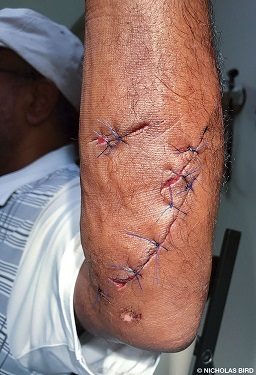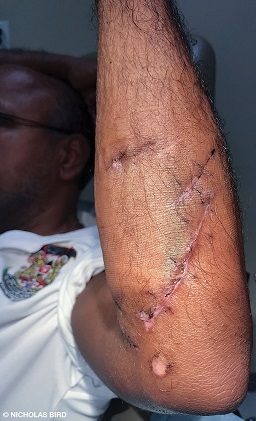
DAN® members share an appreciation for the ocean along with the knowledge that it can also be dangerous. We take measures to protect ourselves, but unforeseen incidents still occur. While caution provides the first and best defense, the ability to respond to emergencies is crucial. As chief operations officer at DAN, I spend a lot of time thinking about how to reduce the likelihood of in-water emergencies. Even so, I recently found myself in the aftermath of a rare encounter and in need of urgent medical attention.
On the final day of a trip to Grand Cayman, I was taking a morning swim before my early-afternoon flight home. While swimming the backstroke in relatively shallow water just off Seven Mile Beach, I felt something hit me on my lower left arm, and it took me a moment to realize I had been bitten. Whatever it was returned twice more to bite me a total of three times.
In the confusion I never saw what bit me. I was swimming for exercise and as such was not wearing a face mask, but clearly the bites were severe. My first thought was that it was a shark, in which case things could quickly get a lot worse. So I marshaled my energy and made my way to the beach, where by pure luck a passing jogger happened to be a nurse.
She immediately improvised a tourniquet, while a recently graduated emergency medical technician (EMT) called local emergency services, which transported me to Cayman Islands Hospital in George Town, where I promptly received first-rate care. They cleaned my wound, stitched me up, administered antibiotics and discharged me so promptly that I was able to make my 12:30 p.m. flight home. Still, I left the island a bit discombobulated and with lots of questions about what had happened to me.

When I got home, I sent photos of my injury to marine and wilderness medicine expert Paul Auerbach, M.D., at Stanford Health Care. He asked if I had been wearing anything shiny — the triangular nature of my bites suggested I had encountered a barracuda. Some people think it is a myth that barracudas are attracted to shiny objects, but I had in fact been wearing a small medallion — a family heirloom — that had likely slipped around to the underside of my body as I swam on my back. We cannot say with certainty that the medallion prompted the attack, but the directors of Marine Conservation International, who were conducting shark research in the Caymans at the time of my injury, confirmed the bites I received were almost indisputably from a barracuda.
The beach where I was swimming is not known to be an area where sharks or barracudas bite people. As true ocean lovers, we know that we are in their habitat after all. I was incredibly fortunate to meet a medical professional who could treat me the minute I returned to the beach and to have ready access to an excellent hospital, but the outcome may have been different had I been swimming or diving in a remote area.

However rare such an incident may be, it reaffirmed my belief in our mission: No matter how unlikely it is for a hazard to be a problem, the unexpected can happen. For this very reason DAN is so committed to educating and supporting first-aid providers and medical professionals around the world.
| © Alert Diver — Q1 2018 |